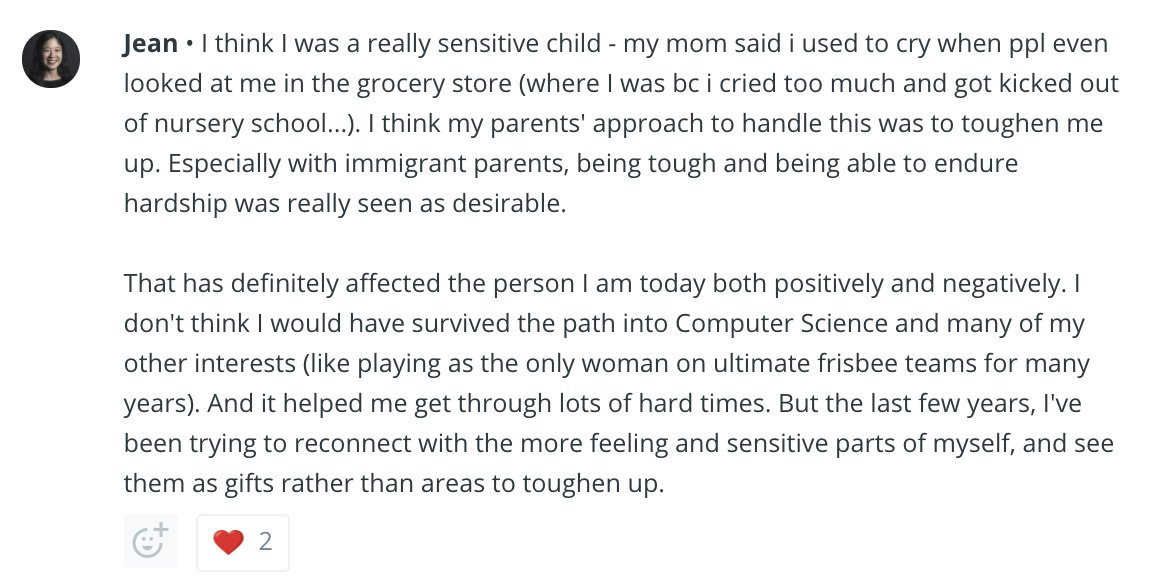Last week, I had the delight of eavesdropping on what was basically life group coaching for kids, which was not something I knew I needed in my life.
Alina, my 7 year-old, has been attending a weekly virtual class called “Life Lessons with Avatar, the Last Airbender.” As I listened in on the first class, the instructor kept a zoom-ful of 7-8 year-olds engaged with a tightly structured 35 minute class, calling on kids to answer: What words would you use to describe Aang? What about Katara? What about yourself? (Alina said she was silly because she was still in her pajamas). They watched a few clips from the show and talked about how Toph uses her blindness to her advantage as she uses her heightened sensitivity to become the best earthbender.
They each talked about one of their strengths and weaknesses, and then one-by-one, the instructor led them through an exercise of pretending a big boulder (representing one of life’s challenges) was rolling towards them, and they had to use their unique traits to earth-bend the boulder.
The most fascinating part was a conversation about how what is perceived to be weakness can also be your strength (just like Toph!). One kid said his weakness was sleeping in, but the instructor pointed out, it also allows him to be well-rested 😅.
What a light-hearted reminder for myself, too, that my weaknesses can also be my strengths. And on the flip side, my strengths can also be my weaknesses. Here are a few that come to mind for me:
Impatient
Until a few years ago, I thought I was too impatient — something I grew up thinking. “He’s just like you were! 个性很急,” my mom says to me over Facetime whenever Jackson gets frustrated that something’s not working or his sister talks over him. He has a rushed nature. During my time at Medium, though, I started to see that my impatience was also an impulse to act and low tolerance for things not going anywhere. It let me sense into when a meeting was going off track, and ask questions or set up recurring prompts to make sure the time was well-spent. Afterwards, other people would come up and thank me for interjecting. It biased me towards action, critically important for early-stage startups.
Judgmental
Hand-in-hand with impatience, I also sometimes wish I were less judgmental. Especially in COVID-times, gosh it is hard to keep in check! It just feels so good sometimes to text a good friend, “Wow did you see what so-and-so posted on twitter/instagram/FB?!” and then I also feel shame for being unkind and gossipy. That could still be something legitimate for me to work on…but on the flip side, I believe my judgment is fundamentally sound. It’s an intuitive guide that raises a flag when something doesn’t feel good to me, often even before my rational process has figured out why. It lets me know when it’s time to set boundaries and let go of friendships, and it means that the people I do spend time with are people I can trust.
Sensitive
And sensitivity. I shared a little about that in Range the other day, while answering the team question: “What’s one way in which your childhood has affected the person you are today?”
In the last few years, getting more in touch with my sensitivity has let me be a better partner, a better leader, and a better parent. My sensitivity also makes space for others’ feelings too, and I can approach hard conversations at home or at work (also at home😂) with much more empathy.
—
A few years ago, I read The Dark Side of Light Chasers. The book speaks to the idea that as a society, we’ve labeled certain traits as negative or positive (as weaknesses or strengths), and that labeling makes it hard for people to tolerate those traits. You might say, “I cannot stand people who are selfish, they are the worst!!” But according to the book, everyone is everything. Everyone is selfish in some ways or another, everyone is lazy, everyone is resourceful. And it’s only when you can look directly at the traits that you can’t stand, can you fill in those blind spots. When you accept that you are also selfish, you can start to play with the ways that selfishness can serve you. Perhaps, in banishing selfishness, you’ve become someone who never sets boundaries, who always puts other people’s needs before your own. By accepting that you are selfish, you can look more clearly at how to be selfish in a way that works for you — maybe carving out time for yourself and taking care of yourself first so that you can take care of others better.
The book has a fascinating exercise that I may dig up again — there’s a long list of adjectives, and you’re supposed to go through them one-by-one. “I am lazy. I am selfish. I am dishonest,” and so on, noting the ones that you can’t bear to say about yourself or that you have a physically intense reaction to. Those are the ones to pay attention to.
Yes, I can be impatient, judgmental, and sensitive. That’s not to say that I shouldn’t work on the ways in which those traits show up that are not helpful, but acknowledging them has also helped me see the ways in which they are helpful.
—
What about you? What’s your personality trait that you’ve long thought to be a weakness, and how does this trait actually serve you in some helpful way? And what’s a trait that you just cannot tolerate in other people? How could you find ways lean into that trait more yourself?




